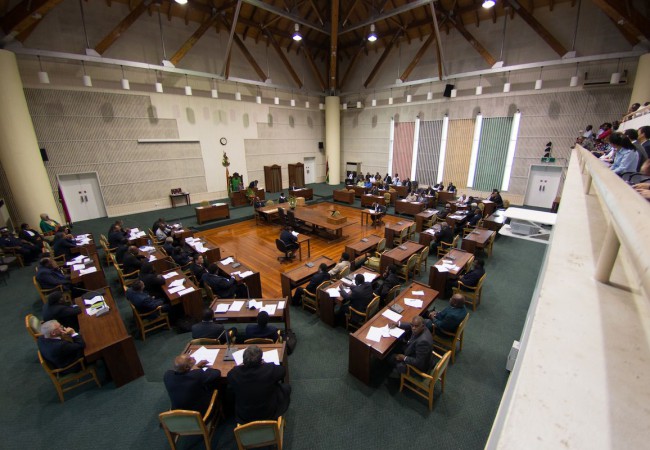
Going through the motions
[UPDATED 2013/03/20 – This article has been edited significantly to reflect recent changes in circumstance. In Vanuatu politics, the period before a no-confidence motion is typically fluid and subject to rapid change.]
There are early indications the motion of no confidence against prime minister Sato Kilman could be serious, with 10 members of parliament originally with the government, moving sides to sit with the opposition yesterday.
According to Port Vila MP Ralph Regenvanu, the following MPs have switched their allegiances and could back the motion on Thursday: Greens Confederation President Moana Carcasses Kalosil, two independents – Thomas Lakin, who is also minister for justice and Richard Namel, Silas Iatan (Greens Affiliate), Richard Mera (Vanua’aku Pati), Tony Wright (Union of Moderate Parties), minister for Ni-Vanuatu Business Marcellino Pipite (VRP), Robert Bohn (Vanuatu Progressive Development Party) and Morkin Stephens (National United Party).
Wright and Mera recently defected to the government side—most probably on the promise of a cabinet reshuffle but it appears Kilman’s hands were tied by existing obligations, making it impossible to meet their demands.
The Vanuatu PM will face the no confidence vote on Thursday at 4pm local time. However, as is the nature of Vanuatu politics, the defectors might yet be wooed back into the government fold before then if Kilman can pull it off again (this would be Kilman’s seventh no-confidence motion), by further reshuffling his cabinet and taking decisive action to address some of the points raised in the motion.
The major test for the opposition will be deciding who gets to head the new government and how the defectors would be rewarded.
The opposition have cited eight major reasons for the motion, the most prominent of which is the ongoing saga of super yacht Phocea – Continuing media investigations suggest that members of the Kilman government may have received financial assistance from the owners to fund their 2012 October election campaigns. There are also reports that some members of Kilman’s coalition are unhappy with the sharing of portfolios.
Another notable reason for the motion against Kilman is his apparent inability to act on serious allegations against the director general of Internal Affairs whom media reports alleged has set up a private company in his name to process visas—a role traditionally handled by the department of immigration, which is under his responsibility.
Apparently in retaliation for the no confidence motion, the government put forward its own motion to remove, populist MP and leader of the growing Groan Mo Jastis Pati (GJP), Ralph Regenvanu from parliament for ‘destabilising’ the government.
Mr. Regenvanu has told radio Australia he was unaware of any valid reasons for such punitive action by the Kilman government, and that he has not broken any laws, or parliamentary standing orders. Whether the government will have a numerical advantage and be able to silence the often outspoken Regenvanu remains to be seen.
This is not the first time Regenvanu has been taken to task for his directness, which can be perceived within some quarters as pushing beyond the boundary of the Melanesian culture of respect for authority. In 2008, he was lambasted in parliament by government MPs, notably by National United Party’s (NUP) Patrick Crowby and former controversial Public Utilities Minister and then VP renegade the late Harry Iauko, for circulating an email that accused the then Natapei government of widespread corruption. He was ordered by the speaker to make an apology, which he later did.
Regenvanu recently lashed out at the Kilman government for its lack of fiscal responsibility in 2012, and for allocating much less than expected to government priority areas such as decentralisation in its 2013 budget. He also challenged Kilman to show he was in control, citing some directors buying 25 new vehicles, contrary to the PM’s own directive.
